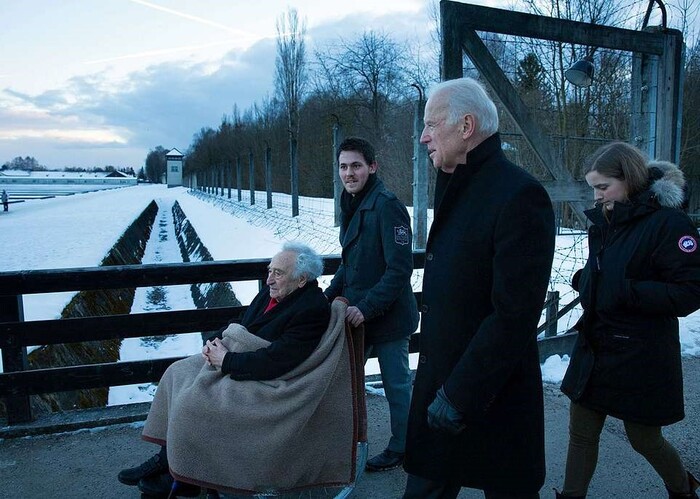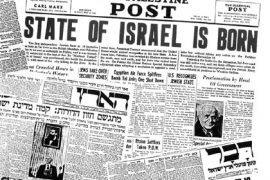Joe Biden delivered a speech yesterday at a bipartisan Holocaust remembrance event in the US capital. The president’s remarks, at the United States Holocaust Memorial Museum, was covered by The Times in an article by Alistair Dawber (“Joe Biden warns of ‘ferocious surge’ of antisemitism in America”, May 7), which noted elements of Biden’s address:
He said Hamas’s attacks and the subsequent war had “brought to life” dormant antisemitism, and suggested that some of the protesters on campus appeared to have forgotten who was responsible for the violence”.
“We’re at risk of people not knowing the truth,” Biden said. “This hatred continues to lie deep in the hearts of too many people in the world. Driven by ancient desire to wipe out the Jewish people off the face of the Earth, over 1,200 innocent people, babies, parents, grandparents, slaughtered in their kibbutz, massacred at a music festival, brutally raped, mutilated and sexually assaulted … hundreds taken hostage including survivors of the Shoah,” he said of the October 7 attacks.
“Now here we are, not 75 years later, but just seven and a half months later, and people are already forgetting that Hamas unleashed this terror, that it was Hamas that brutalised Israelis, it was Hamas who took and continued to hold hostages.”
However, then Dawber inserted the following:
He made no reference to the more than 34,000 Palestinian lives lost during the conflict, a number recorded by the Hamas-controlled ministry of health in Gaza.
However, why would Dawber expect the US president, in a speech commemorating the systematic murder of six million Jews by the Nazis, mention Palestinians?
There are many ways to read this, but, given the context, as well as having covered the journalist’s writing over the years, it seems to be a way of legitimising the odious canard that Israel is committing a genocide in Gaza. It also reflects a broader media pattern of centering Palestinians in articles about antisemitism, such as when reports on efforts to promote the IHRA Working Definition of Antisemitism includes complaints that IHRA will ‘silence’ Palestinian voices. This is particularly absurd narrative given that Palestinians are, based on polling, among most antisemitic people on the globe.
But, in the context of the war, the Times journalist’s framing also likely represents an effort to pushback at Biden’s correct assessment that, on Oct, 7, the Palestinian terror group which runs Gaza carried out the most lethal and barbaric (trigger warning) antisemitic atrocity since the Holocaust.
In fact, Biden’s speech included the observation that “That [ancient antisemitic] hatred was brought to life on October 7th in 2023. On a sacred Jewish holiday, the terrorist group Hamas unleashed the deadliest day of the Jewish people since the Holocaust.” The president also said that “Too many people denying, downplaying, rationalizing, ignoring the horrors of the Holocaust and October 7th, including Hamas’s appalling use of sexual violence to torture and terrorize Jews.”
Dawber’s insistence on downplaying antisemitism is also evident in a sentence further into the article:
[Biden] did acknowledge, however, that Tuesday’s memorial was taking place in “difficult times”. Addressing the university protests, which have witnessed antisemitic and Islamophobic attacks.
Though the harassment, intimidation, extremist rhetoric and violence directed at Jews during the anti-Israel campus protests has been widespread and well documented, we’re unaware of reports about racist attacks on Muslim students at the demos.
Further, context that Dawber chose not to add is that antisemitism has soared in Western countries since the Oct. 7th massacre – showing that what’s been happening on campuses is part of a larger problem, one which most British media outlets have been loathe to acknowledge: that the pathological hatred of Israel is intrinsically linked to hatred of Jews qua Jews.
Annual Antisemitism Worldwide Report, published by Tel Aviv University and the @ADL,
reveals that 2023 saw a huge increase in the number of antisemitic incidents in Western countries in comparison to 2022.1/2 pic.twitter.com/0drKS4UDxq
— CAMERA UK (@CAMERAorgUK) May 6, 2024
As Dave Rich of the CST observed on Oct. 9th during a pro-Palestinian demo in London, when the burnt, blood-soaked, mutilated and brutalissed remains of murdered Jews were still scattered across towns like Be’eri, Kfar Aza and Ne’im, Nahal Oz, and Afakim, “the mood [in the city] was celebratory. Flares were lit, flags flown, slogans chanted. People danced. Thousands descended on the Israeli embassy before hundreds made their way to central London last night, blocking roads and filling the streets as they partied. This was an expression of joy, not an explosion of rage.”
This evening's demonstration in London could best be described as having a carnival atmosphere as revellers danced and sang praising the Intifada and by extension the mass slaughter of Jews in Israel by Hamas pic.twitter.com/fLQ2eSKWN9
— Harry's Place (@hurryupharry) October 9, 2023
If Oct. 7th and its aftermath has taught us anything, it’s that antisemitism is a feature of the pro-Palestinian movement, not a bug. Holocaust remembrance, if it’s to represent something serious, must grapple with this hard truth.
Related Posts
Guardian plays down antisemitism within campus anti-Israel movement





